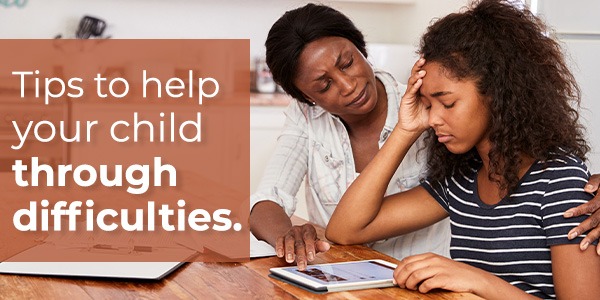
A child’s character develops in accordance with the obstacles he has encountered…or the freedom favoring his development that he has enjoyed. Maria Montessori
Childhood is a mixed platter of happy and sad emotions accompanied by physical stresses. Do you agree? Coping up depends on how adults or siblings support. Today though your children probably may have a bit more challenges, what’s important is how quickly you identify the difficulty your child is going through.
Whether a sibling tiff or an unfortunate unprecedented incident, taking your child forward brave and resilient is the meat of the matter. Find some tips to help your child through difficulties as you read along.
Talk About Feelings
Experts say parents should talk to their children and listen. It is true, as it creates a habit of healthy and friendly conversations. Share your feelings about a pleasant or sad incident at the office and ask your child to share theirs. This practice of sharing emotions will naturally build trust between both of you and may even feel mutually responsible for your well being.
Look For Signs
Anxiety, fear, anger and jealousy are some signs you can look for. If your child shows sudden behavioural changes, probe until you find the reason. It will be easy if your child generally talks about his feelings during friendly chats.
Figure Out The Crisis
Children may hide incidents from you or take things in stride. However, discussing the same will reduce the emotional load on your child. Remind them to talk to you about shocking or sad incidents at school, neighbourhood or home. Once you figure out the crisis, give them practical solutions.
Answer Their Questions
Any traumatic incident will leave your child with many questions. Convincingly answer them, but be thoughtful and honest with them. Before answering, get your thoughts clear on the incident as it’s important how you get the message across to your child.
Reassure
When emotions don’t settle quickly in your child, understand that they need physical contact or reassurance. Hugs make them feel protected and secure. Instead of giving false hopes, tell your child about how everyone is trying to overcome the situation in the best way possible.